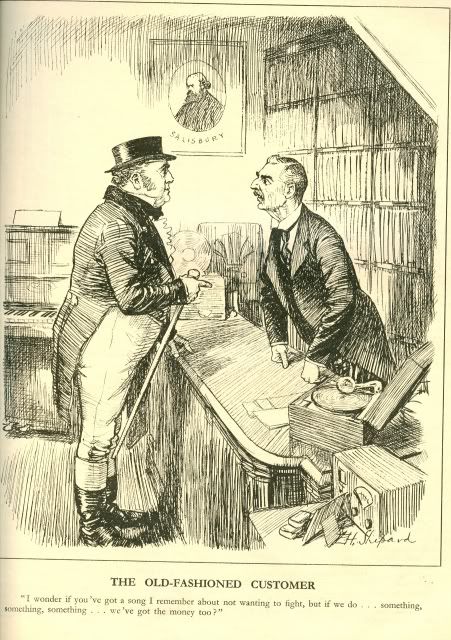
1938: Why Don’t We Beat the Patriotic Drum?
Here is another recognition that storm clouds are massing over Europe. This cartoon doesn’t, for once, try to ignore the signs. Here John Bull is pursuing a vague hunch. He has come into Prime Minister Chamberlain’s music shop in search of a half remembered patriotic song.
The song itself dates from the days of Britain’s pre-eminence in all things including the military. Then patriotic patrons of the music halls would cheerfully bellow out the refrain:
We don’t want the fight
but by Jingo if we do
we’ve got the ships
we’ve got the men
and we’ve got the money too.
While Salisbury was Prime Minister that was all it took to pursue a successful war. By Chamberlain’s time ships were not enough in the way of military hardware. By this date Hitler’s armaments industry was turning out tanks, planes and artillery pieces in immense numbers. For Britain the money was not there. It would have to be borrowed.
Here is one cartoonist who is wondering whether appeasement is going to work and suggests that the alternative will indeed be expensive but also necessary.
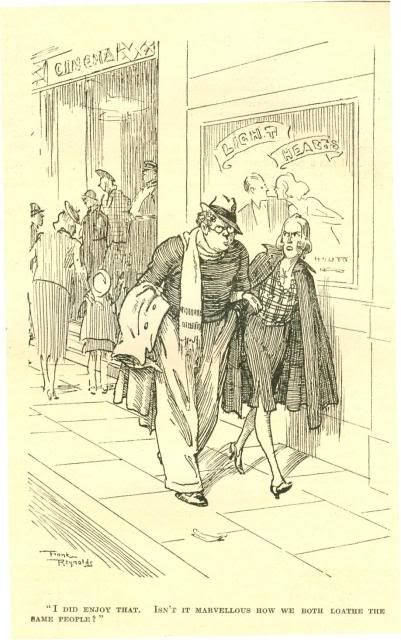
1938: The Avant Garde
This is how intellectuals looked and behaved in 1938.
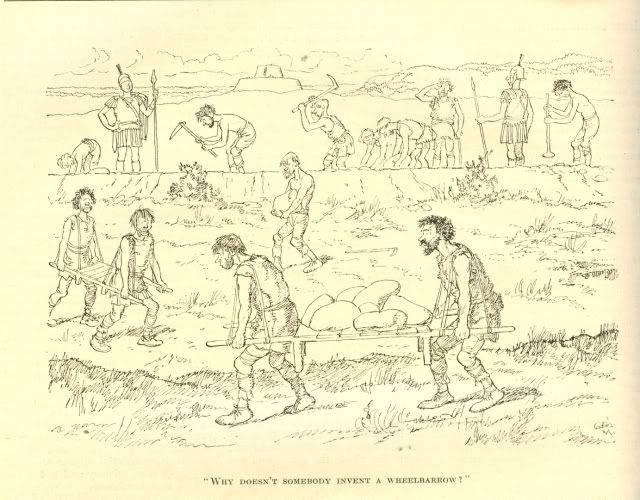
1938: Anachronism
If they knew what a wheel barrow was there would not be a need to invent it.
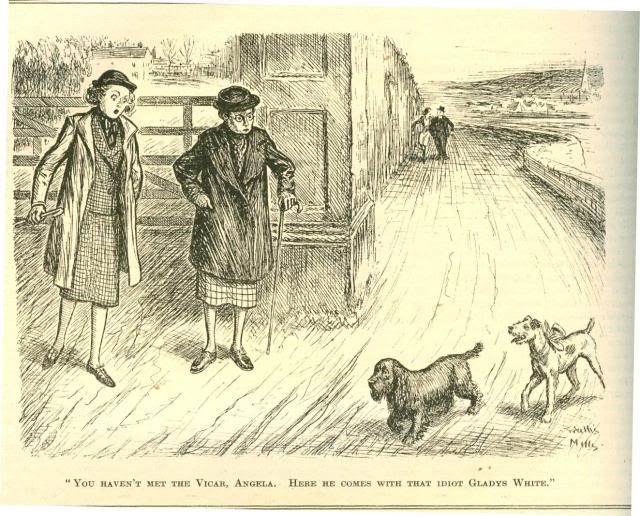
1938: How Does She Know?
The vicar is an object of great interest to his female flock. The speaker can read the signs. Can you?
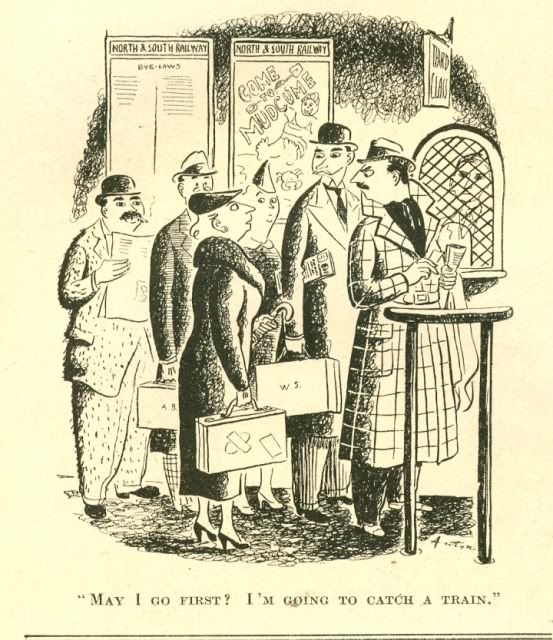
1938: Let Me Through Because I Am Important
Why does she think the other people are there? I have known one or two people like her.
This is the earliest cartoon by Anton that I have come across.
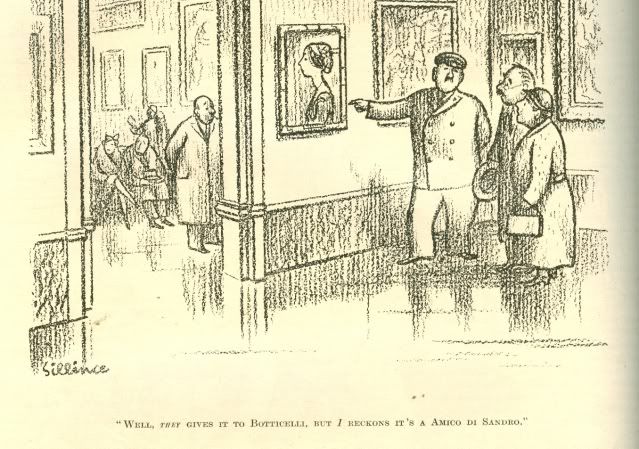
1938: How Dare He Express an Opinion?
How hilarious! A mere porter employed at the gallery dares to express an opinion about attribution. He hasn’t studied Art History like a proper expert. He just talked about something that he was looking at every day.
The taste for this sort of humour has vanished some time ago. I remember the Monty Python team ran a piece in which someone began a paraphrase of Proust. He did so – wait for it! – in a north country accent!!! Everyone fell about laughing. How could a north countryman be expected to know anything at all about the arts?
Not all political correctness is absurd.
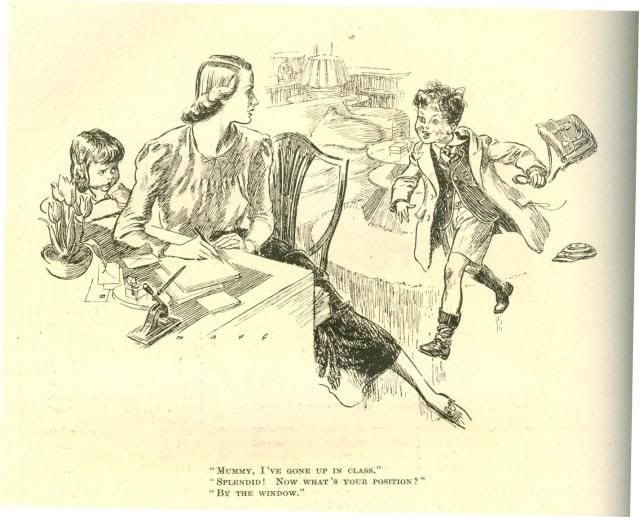
1938: Differing Ideas about Progress
He reckons that he has gone up in the class because he is now by the window. Could this because he will be able to look out of the window more easily?
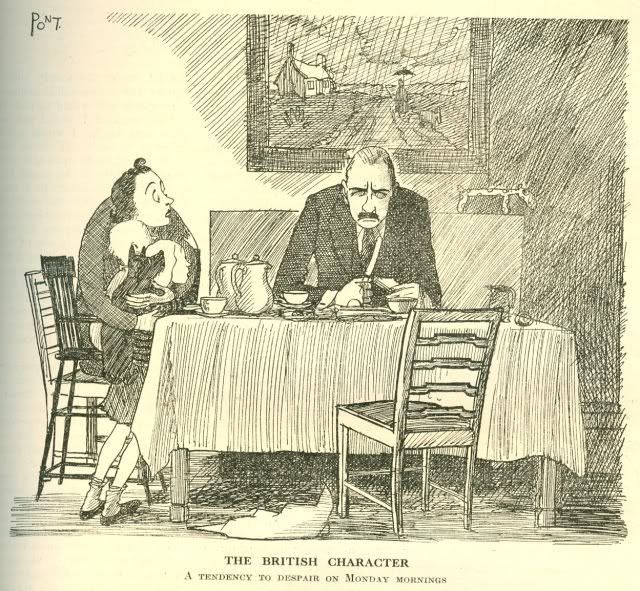
1938: That Monday Morning Feeling
No change there, for many people.
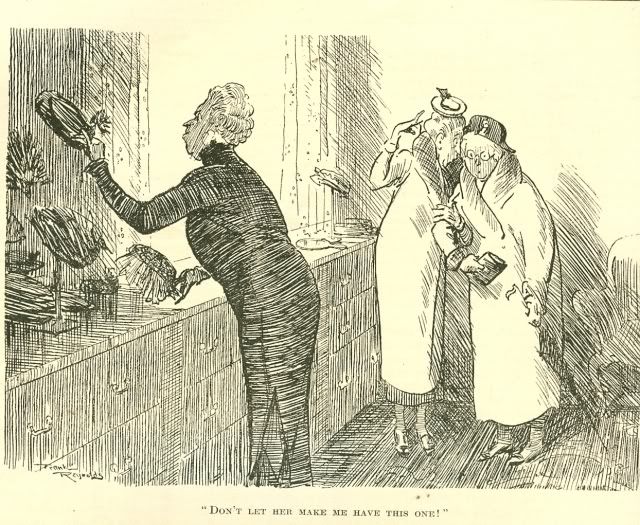
1938: The Power of Persuasion
She knows that she can too easily be persuaded. She needs assertiveness training. Not readily available in 1938.
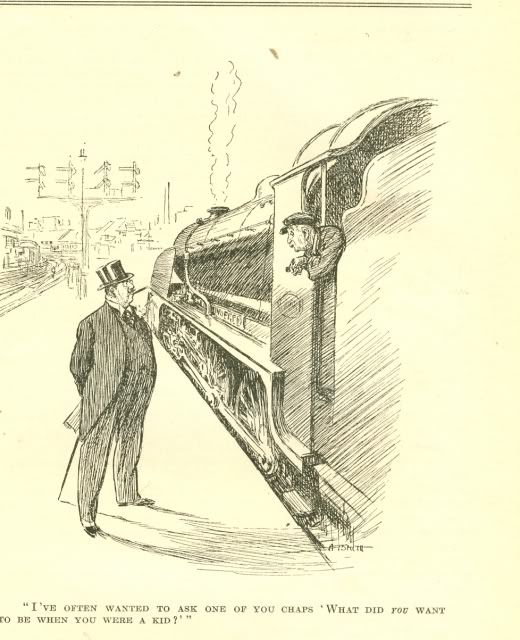
1938: Man to Man
How quaint this conversation seems today. Yet there was a time when many a boy’s dream really was to be an engine driver. Could that have included a future ‘captain of industry’? Yes, I rather think it could.
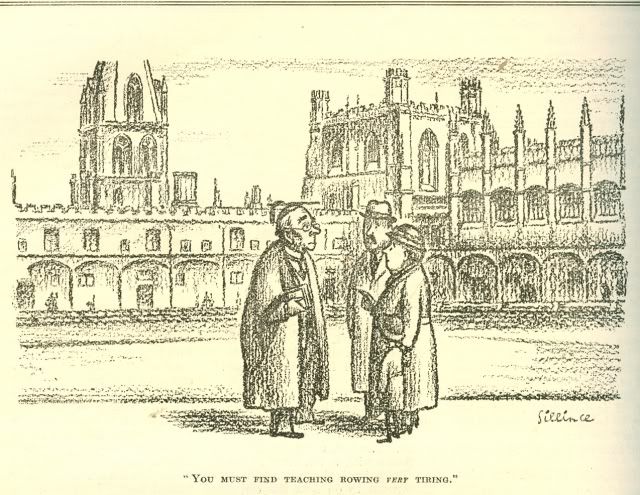
1938: What Do They Teach at Oxford and Cambridge?
She only thinks of these universities in the context of the annual boat race. A bit far-fetched but it makes for an amusing cartoon. The aged don could tell you all about the oarsmen in the Athenian Navy during the Peloponnesian War (431–404 BC) but had probably never rowed in his life.
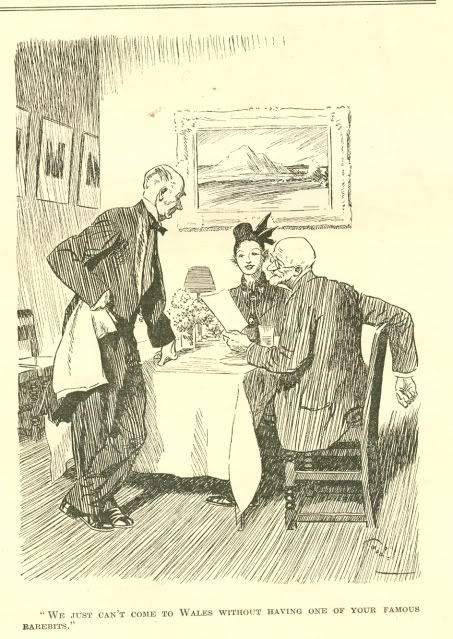
1938: Tourists in Wales
I rather think that the point of this joke is that it is served everywhere, not just in Wales. That would suggest that the bearded diner is not accustomed to eating this dish.
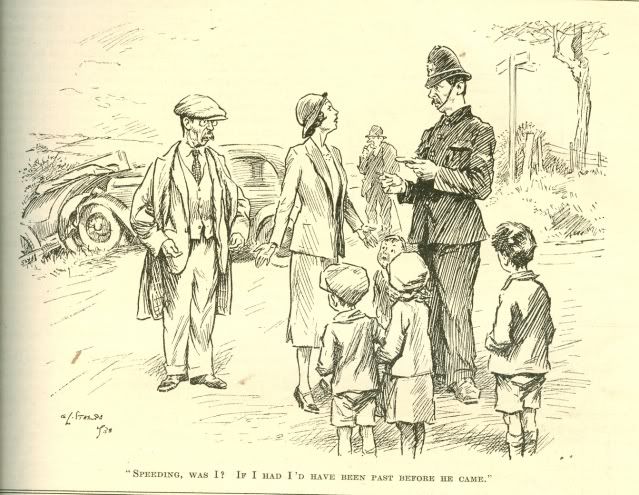
1938: Alternative Theory of Relativity
It looks as though it was her car that smashed into his. It’s going to be hard for her to talk her way out of this fact. On the plus side there has been absolutely no damage to life and limb.
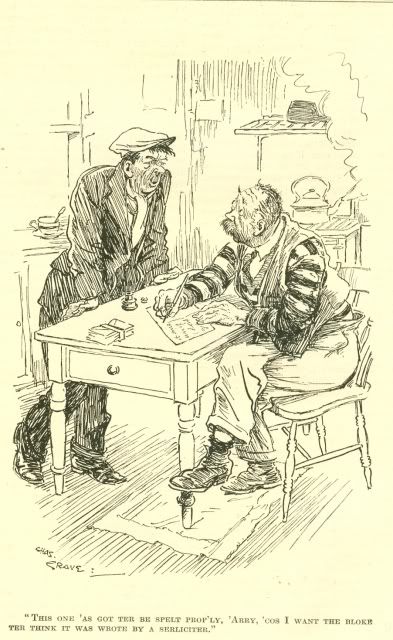
1938: I am Educated: You are Ignorant
It was then considered quite acceptable to mock uneducated people. ‘Arry’ has no chance of producing the desired effect in his letter.
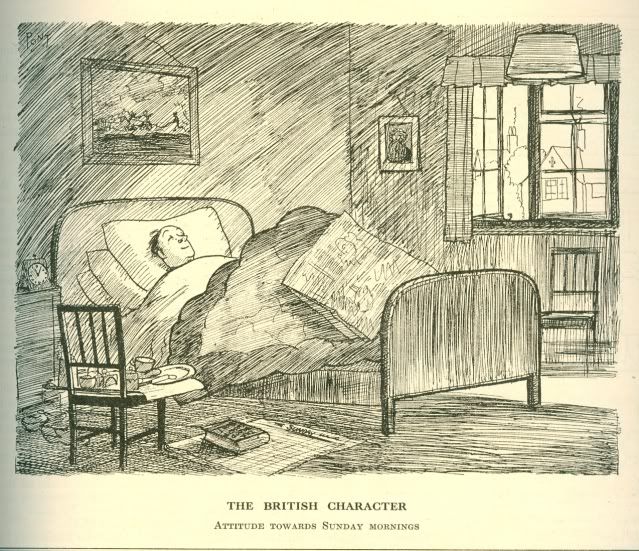
1938: A Day Off
How innocent this scene seems today. Breakfast, the Sunday Papers and a book and he’s still in bed although it is now past 11 a.m. Today’s equivalent would be a lot more elaborate.
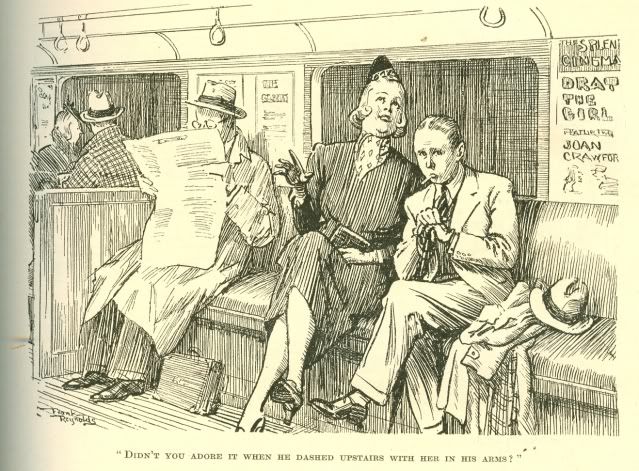
1938: Is He Man Enough?
He wouldn’t be up to doing that and he knows it. I wonder whether she does.
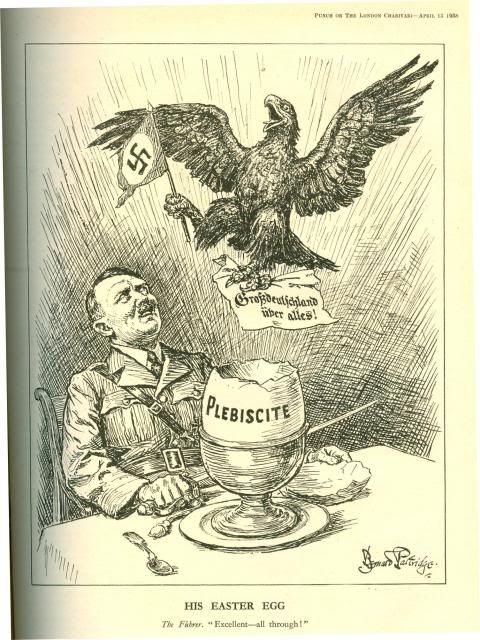
1938: Let’s Hope it’s All Right
Here the cartoonist persists in hoping that a major war can still be averted by stressing the plus points and ignoring the negative ones. Hitler had annexed Austria by simply marching in. Cheering crowds welcomed the soldiers as they arrived. Hitler himself addressed the population of Vienna who were cheering him hysterically. A month later the plebiscite had endorsed his action by a reported 99.7% vote in his favour. There was also the undoubted fact that you can be an ethnic German, an ethnic Pole but you can’t be an ethnic Austrian: there is no such animal. Ethnically speaking the Austrians are German. OK, so treaties had been broken and the League of Nations had been ignored but why make a fuss when the people concerned are enthusiastically in favour?
What the optimists were ignoring was the nature of the German regime and the process of intimidation that had preceded the Anschluss. Would Hitler confine his future adventures simply to other populations that belonged to the German race? Here the assumption is that he would. So Hitler is politely described by the title that he had given himself. No unflattering caricature here.
I am well aware of the counter argument. I was actually there and witnessed the other side of this popular annexation. My parents were not among the cheering crowds and indeed they had nothing to cheer about. They were not allowed to vote in the plebiscite. Not so much second class citizens as not citizens at all. The polite words for our status now was ‘state guests.’ There were plenty of other words and none of those were polite. I also know another aspect of that plebiscite. Although officially voting was in secret all the voters insisted on showing their ‘Yes’ votes to the officials. No doubt these were the same people who had been cheering enthusiastically a month earlier. Had they now become fearful after such a short time? I have no idea but the possibility certainly exists.
The cartoonist was also ignoring reports in the British press of what had been happening in Germany and was now was also taking place in the former Austria: people beaten up and their property taken away by force. And that was just the start…
But the optimists still held on to the hope that war could be averted and anyway Hitler was very sound in his views on Communism.
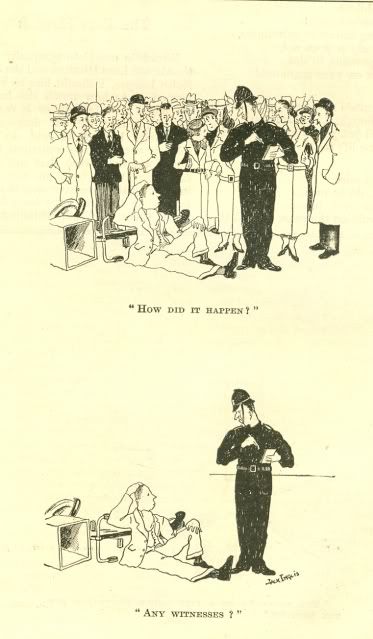
1938: Disappearing Witnesses
Not wanting to get involved with witness statements is nothing new. Even so, I’m sure that the burden today would be much greater than it was in 1938.
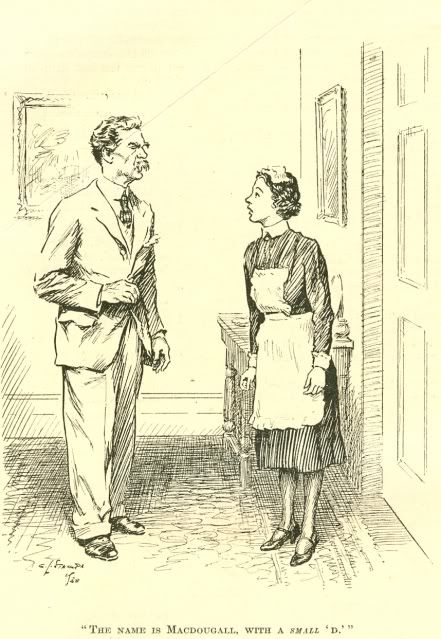
1938: How He Identifies Himself
There is no way that she can pronounce the small D but he still can’t stop himself from stressing this distinguishing aspect of his name.
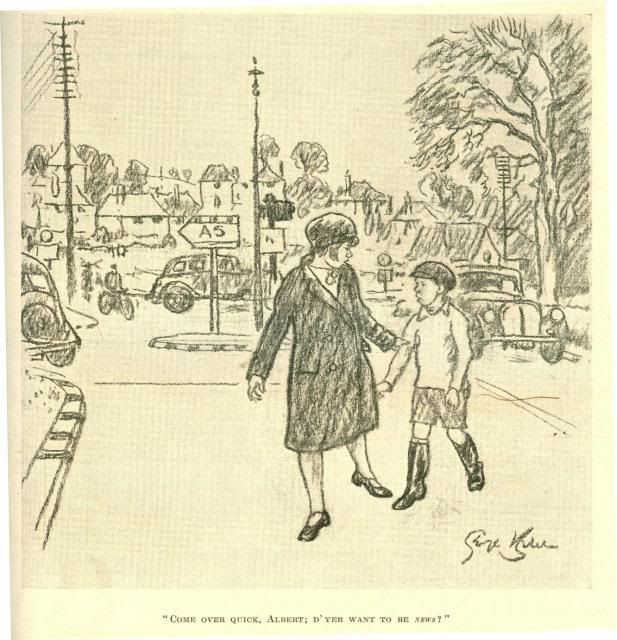
1938: Heavy Traffic on the A5
Albert’s big sister uses up-to-date jargon in order to get him to negotiate heavy road traffic as it seemed at the time.
Another offering from George Belcher showing life as experienced outside the charmed circle of Punch readers.




















